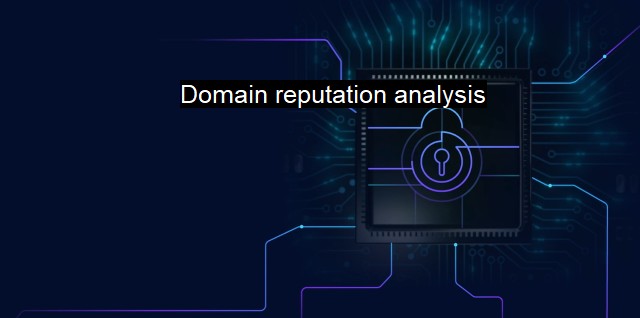What are Domain reputation analysis?
The Importance of Domain Reputation Analysis in Modern Cybersecurity
Domain reputation analysis is a crucial aspect within the realm of cybersecurity and antivirus. At its core, it is the process of determining the credibility and safety of a domain name. A domain, in layman’s terms, refers to the address of a website over the internet. Each domain has a reputation, much like individuals or businesses in the real world. This reputation is built over time based on various interactions, activities, and behavior linked with the domain.Domain reputation analysis assesses the reputation of a domain to provide a verdict on its safety and reliability. Various factors like the age of the domain, its behavior, registrations details, owner credibility, activities conducted, and content it hosts play a significant role in impacting the reputation score. Simply put, the more reputable the domain, the safer it is to interact with.
The reason why domain reputation analysis is crucial lies in its role in cybersecurity. The internet is rife with harmful websites hosting malicious content with the intent of infecting the devices of unsuspecting victims on visiting these websites. These websites can harbor phishing schemes, email spam, malicious downloads, self-executing scripts, and various types of malware. By investigating and scoring the domain's reputation, users and systems can filter out potentially harmful sites and reduce the threat exposure. A higher score implies a safer domain and a lower score is indicative of potential risks associated with the domain.
Anti-virus solutions heavily rely upon domain reputation analysis for ensuring the safety of the users’ systems. The antivirus software performs real-time checks on the domains the user interacts with, cross-referencing it with databases detailing 'known-bad' as well as 'trusted' domains. Whenever a user hops onto a risky domain, the antivirus solution flags it, alerting the user, or blocking access to protect the system.
Numerous reliable domain reputation databases are available, fed and maintained by cyber-sec communities, security research firms, and third-party vendors. These databases are continuously updated with suspicious and reliable domain names from all over the internet. Domain reputation analysis services tap into these databases for real-time lookup during forensic investigations, as well as preventive cybersecurity routines.
One significant limitation is the fleeting nature of malicious domains. Cybercriminals frequently switch domain addresses for their hoaxing activities to evade cybersecurity measures, making the process of maintaining the reputation score of domains an ongoing challenge.
Machine learning and artificial intelligence are vastly incorporated into domain reputation analysis systems for predictive scoring, using historical behavior data to foresee the plausible future activities of a domain. This predictive scoring is especially effective in detecting ‘sleeper’ domains - domains that remain dormant for long periods, only to become active unexpectedly to launch attacks.
Comprehensive cybersecurity strategies amalgamate domain reputation analysis with IP address reputation, URL reputation, file reputation, and more. This combined analysis helps develop a precise safety score for a domain.
Domain reputation analysis remains key in upholding the principal theme of cybersecurity - 'Trust but Verify.' The Internet might be a vast and welcoming space, but not all in it have benign purposes. Deducing the credibility of a domain is significant in breeding a safer cyberspace. It results in inoculating devices from potential threats, curtailing phishing attempts, reducing spam emails, eliminating risk exposure, and substantially bolstering the overall cybersecurity posture of organizations and individuals alike. Domain reputation analysis is, thus, integral to cybersecurity and antivirus operations.

Domain reputation analysis FAQs
What is a domain reputation analysis?
A domain reputation analysis is an evaluation of a domain's history, behavior, and characteristics to determine its trustworthiness and security status. It involves assessing a domain's online presence, including its website content, IP address, email practices, and other factors, to identify potential security risks and threats.Why is domain reputation analysis important in cybersecurity?
Domain reputation analysis is critical in cybersecurity as it helps detect and prevent potential cyber attacks, such as phishing, spam, malware, and other malicious activities. By analyzing a domain's reputation, cybersecurity experts can identify and block suspicious domains, preventing attackers from accessing sensitive information and compromising systems. It also helps in verifying the authenticity of a domain, protecting users from engaging with fake or fraudulent websites.What are the factors considered in domain reputation analysis?
Several factors are taken into consideration when conducting domain reputation analysis, such as the domain's age and registration history, IP address reputation, SSL/TLS certificate, DNS configuration, email authentication, and content analysis. These factors help to determine whether a domain is trustworthy, secure, and legitimate, or potentially malicious and dangerous.How can I check the reputation of a domain?
There are several tools and services available online that can help you check the reputation of a domain, such as Google Safe Browsing, VirusTotal, DomainTools, and more. These tools evaluate a domain's reputation based on multiple factors, including its history, behavior, and characteristics, and provide insights into potential security risks and threats. You can also hire cybersecurity experts to conduct a thorough domain reputation analysis and provide recommendations to enhance your cybersecurity posture.| | A | | | B | | | C | | | D | | | E | | | F | | | G | | | H | | | I | | | J | | | K | | | L | | | M | |
| | N | | | O | | | P | | | Q | | | R | | | S | | | T | | | U | | | V | | | W | | | X | | | Y | | | Z | |
| | 1 | | | 2 | | | 3 | | | 4 | | | 7 | | | 8 | | |||||||